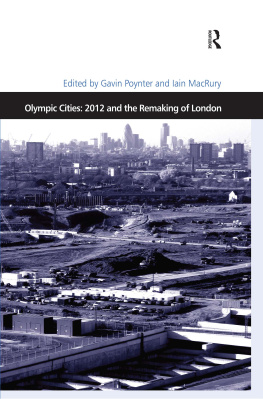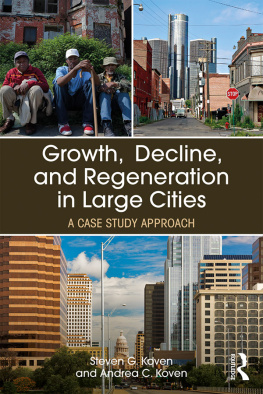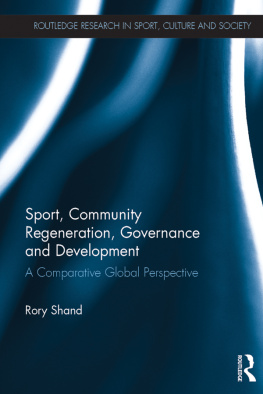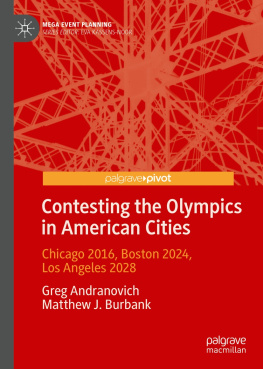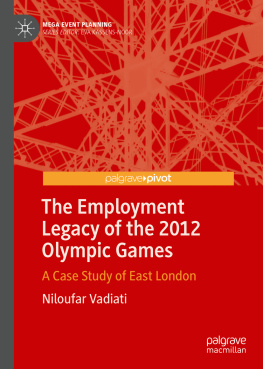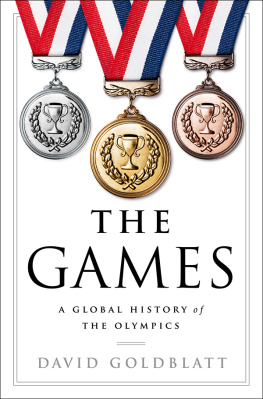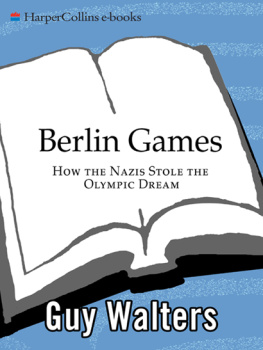First published 2009 by Ashgate Publishing
Taylor & Francis Group London and New York
Copyright Gavin Poynter and Iain MacRury 2009
CRC Press is an imprint of Taylor & Francis Group, an Informa business
Published 2016 by Routledge
2 Park Square, Milton Park, Abingdon, Oxon 0X14 4RN
711 Third Avenue, New York, NY 10017, USA
Routledge is an imprint of the Taylor & Francis Group, an informa business
Gavin Poynter and Iain MacRury have asserted their right under the Copyright, Designs and Patents Act, 1988, to be identified as the editors of this work.
All rights reserved. No part of this book may be reprinted or reproduced or utilised in any form or by any electronic, mechanical, or other means, now known or hereafter invented, including photocopying and recording, or in any information storage or retrieval system, without permission in writing from the publishers.
Notice:
Product or corporate names may be trademarks or registered trademarks, and are used only for identification and explanation without intent to infringe.
British Library Cataloguing in Publication Data
Olympic cities : 2012 and the remaking of London.
(Design and the built environment series)
1. Olympic host city selection-2012. 2. Olympic host city
selection-History. 3. Olympics-Environmental aspects
England-London. 4. Olympics-Social aspects-England
London. 5. Urban renewal-EnglandLondon-Case studies.
6. East End (London, England)-Economic policy. 7. East End
(London, England)-Social policy.
I. Series II. Poynter, Gavin, 1949- III. MacRury, Iain.
796.48-dc22
Library of Congress Cataloging-in-Publication Data
Poynter, Gavin, 1949
Olympic cities: 2012 and the remaking of London / by Gavin Poynter and Iain
MacRury.
p. cm. (Design and the built environment)
Includes bibliographical references and index.
ISBN 978-0-7546-7100-8
1. Olympic Games (30th : 2012 : London, England) 2. City planning-England
London. 3. Urban renewalEnglandLondon. 4. Olympics-History-Case studies. 5.
East End (London, England)Buildings, structures, etc. 6. East End (London, England)
Environmental conditions. I. MacRury, Iain. II. Title.
GV7222012.P69 2009
796.48dc22
2009008826
ISBN 13: 978-0-7546-7100-8 (hbk)
ISBN: 978-1-3152-4774-8 (hbk)
ISBN: 978-1-3152-4774-8 (ebk)
The Editors
Iain MacRury is Director of London East Research Institute and Principal Lecturer in Cultural Studies and Creative Industries, School of Social Sciences, Media and Cultural Studies, University of East London.
Gavin Poynter is Chair, London East Research Institute and Professor of Social Sciences, School of Social Sciences, Media and Cultural Studies, University of East London.
Other Contributors
Dean Baim is Professor of Economics and Finance, Seaver College, Pepperdine University and Visiting Research Scholar, Humanistics Olympics Studies Center, Remnin University, China.
Penny Bernstock is Senior Lecturer in Social Policy, School of Social Sciences, Media and Cultural Studies, and a member of the Management Board of London East Research Institute, University of East London.
Andrew Blake is Professor and Associate Dean of the School of Social Sciences, Media and Cultural Studies and a member of the Management Board of London East Research Institute, University of East London.
Ferran Brunet is Professor of Economics in the Faculty of Economics and member of the Center for Olympic Studies, Universitat Autonoma de Barcelona.
Andrew Calcutt is convenor of the MA in Journalism and Society, School of Social Sciences, Media and Cultural Studies, Editor of Rising East and member of the London East Research Institute Management Board, University of East London.
Richard Cashman is Adjunct Professor and Director of the Australian Center for Olympic Studies, University of Technology, Sydney.
Allan Edwards is a Senior Lecturer at Griffith University on the Gold Coast, Australia and co-author of Qualitative Research in Sport Management,Butterworth-Heinemann 2009.
Keith Gilbert is Director of the Centre for Disabilities, Sport and Health in the School of Health and Biosciences at the University of East London. He is author of a number of books and papers on Olympic and Paralympic issues, and co-editor of The Paralympic Games: Empowerment or Side Show, Meyer & Meyer 2009.
Kevin Hylton is Senior Lecturer in Sport and Education Development, Carnegie Faculty of Sport and Education, Leeds Metropolitan University.
Nigel D. Morpeth is Senior Lecturer in Tourism and Management, Leslie Silver International Faculty, Leeds Metropolitan University.
Roy Panagiotopoulou, is Associate Professor, Department of Communication and Mass Media, University of Athens.
Emma Roberts is a Consultant with WM Enterprise, an economic development and regeneration consultancy.
Michael Rustin is Professor of Sociology, School of Social Sciences, Media and Cultural Studies at the University of East London, a Visiting Professor at the Tavistock and Portman NHS Trust and member of the Management Board of London East Research Institute.
Otto J. Schantz is Dean of the Institute of Sport Sciences at the University of Koblenz-Landau, Germany. He is author of a number of books and papers on Olympic and Paralympic issues, and co-editor of The Paralympic Games: Empowerment or Side Show, Meyer & Meyer 2009.
Paul Toyne is Head of Sustainability, Bovis Lend Lease.
Hyunsun Yoon is Lecturer in Media Studies in the School of Social Sciences, Media and Cultural Studies, University of East London.
Zuo Xinwen is a member of the Olympic Project Office of the Beijing Development and Reform Commission.
Iain MacRury and Gavin Poynter
The Olympic and Paralympic Games is the most important global event in the international sporting calendar. Entering the competition to host the event is not a decision to be taken lightly. Indeed, the bid to stage the Games is in itself a public declaration about the identity and aspirations of the city, and the nation, in which it occurs. What the spectator assigns to memory may vary from images of a black power salute or a terrorist incident to an unexpected victory or a great race. The enduring nature of the image of the event itself is but one dimension of the Games. The pre- and post-event phases create different kinds of dramas. The scale and cost of the contemporary Games demands its organisers to deliver a variety of non-sporting outcomes or legacies for the host city and nation.
Legacy has multiple dimensions, tangible and intangible, that can only be explained and effectively analysed by reference to the social, economic and cultural conditions of that time. Our book examines these conditions, digging beneath the image and the immediacy of the event. It is less about the sociology of sport and more about the sociology of the city; how a sporting mega event captures a moment in time and enhances our understanding of cities and contemporary social, cultural and economic change.

